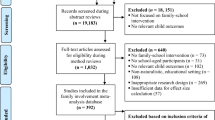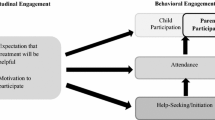Abstract
Objective
The authors assess mentors’ perceptions of mentoring and experiences participating in an intensive, small-group mentorship program, with particular attention to potential challenges in their retention and the recruitment of new mentors to similar, future programs.
Methods
Similar group mentorship programs were implemented at two child and adolescent psychiatry conferences, one national and the other international. The program included three daily small group meetings, one closing meeting for all participants, and administration of a web-based survey.
Results
Of the 43 mentors, 42 (98%) completed the survey, and results were comparable across both programs. Among respondents, 93% found the group experience personally fulfilling and an equally valuable teaching and learning opportunity. Mentors unanimously agreed that co-mentoring enhanced the group mentoring experience. Group diversity enhanced the mentorship process, although differences in trainees’ interests and levels of experience as posed concrete challenges. Sixty-two percent of the mentors thought that they would be able to adapt lessons and experiences from the mentorship program in their home institutions, and 95% agreed to participate if invited to mentor in future programs.
Conclusion
Mentors found the intensive, brief group mentorship model to be a powerful, time-efficient, and enjoyable approach to mentoring, increasing trainees’ exposure to child and adolescent psychiatry. Although group composition, schedule coordination, and logistics warrant closer scrutiny, these positive perceptions bode well for mentor recruitment and retention and for using a similar program in other settings.
Similar content being viewed by others
References
Jackson VA, Palepu A, Szalacha L, et al: Having the right chemistry: a qualitative study of mentoring in academic medicine. Acad Med 2003; 78: 328–334
Ramanan RA, Taylor WC, Davis RB, et al: Mentoring matters: mentoring and career preparation in internal medicine residency training. J Gen Intern Med 2006; 21: 340–345
Bland K: The recruitment of medical students to careers in general surgery: emphasis on the first and second years of medical education. Surgery 2003; 134: 409–413
Nguyen SQ, Divino CM: Surgical residents as medical student mentors. Am J Surg 2007; 193: 90–93
Wasserstein AG, Quistberg AD, Shea JA: Mentoring at the University of Pennsylvania: results of a faculty survey. J Gen Intern Med 2007; 22: 210–214
Wingard DL, Garman KA, Reznik VG: Facilitating faculty success: outcomes and cost benefit of the UCSD National Center of Leadership in academic medicine. Acad Med 2004; 79: 9–11
Sambunjak D, Straus SE, Marusi A: Mentoring in academic medicine: a systematic review. JAMA 2006; 296: 1103–1115
Bozionelos N: Mentoring provided: relation to mentor’s career success, personality, and mentoring received. J Vocational Behavior 2004; 64: 24–46
Allen TD, Lentz E, Day R: Career success outcomes associated with mentoring others: a comparison of mentors and nonmentors. J Career Development 2006; 32: 272–285
Kupfer DF, Hyman SE, Schatzberg AF, et al: Recruiting and retaining future generations of physician scientists in mental health. Arch Gen Psychiatry 2002; 59: 657–660
Reck SJ, Stratman EJ, Vogel C, et al: Assessment of residents’ loss of interest in academic careers and identification of correctable factors. Arch Dermatol 2006; 142: 855–858
Spickard A, Gabbe SG, Christensen JF: Mid-career burnout in generalist and specialist physicians. JAMA 2002; 288: 1447–1450
Levy BD, Katz JT, Wolf MA, et al: An initiative in mentoring to promote residents’ and faculty members’ careers. Acad Med 2004; 79: 845–850
Williams LL, Levine JB, Malhotra S, et al: The good-enough mentoring relationship. Acad Psychiatry 2004; 28: 111–114
Adler R, Martin A, Park C, et al: Mentoring young researchers: can the IACAPAP’s Donald J. Cohen fellowship model be applicable and useful to Australasian psychiatry? Australas Psychiatry 2007; 15: 232–236
Horner MS, Milam SM, Rettew DC, et al: Mentoring increases connectedness and knowledge: a cross-sectional evaluation of two programs in child and adolescent psychiatry. Acad Psychiatry 2008; 32: 420–428
Ebya LT, Durleya JR, Evansa SC, et al: The relationship between short-term mentoring benefits and long-term mentor outcomes. J Vocat Behav 2006; 69: 424–444
Luckhaupt SE, Chin MH, Mangione CM, et al: Mentorship in academic general internal medicine: results of a survey of mentors. J Gen Intern Med 2005; 20: 1014–1018
Davis LL, Little MS, Thornton WL: The art and angst of the mentoring relationship. Acad Psychiatry 1997; 21: 61–71
Cochran A, Paukert JL, Scales EM, et al: How medical students define surgical mentors. Am J Surg 2004; 187: 698–701
Rodenhauser P, Rudisill JR, Dvorak R: Skills for mentors and protégés applicable to psychiatry. Acad Psychiatry 2000; 24: 14–27
Barr LL, Shaffer K, Valley K, et al: Mentoring: applications for the practice of radiology. Invest Radiol 1993; 28: 71–75
De Angelis CD: Women in academic medicine: new insights, same sad news. N Engl J Med 2000; 342: 426–427
Hamel MB, Ingelfinger JR, Phimister E, et al: Women in academic medicine: progress and challenges. N Engl J Med 2006; 355: 310–312
Reisman AB, Gross CP: Gender differences in the ability to identify a mentor at morning report: a multi-institutional study. Teach Learn Med 2002; 14: 236–239
Author information
Authors and Affiliations
Corresponding author
Additional information
On behalf of all the program participants, the authors express their deepest gratitude to the leadership of the American Academy of Child and Adolescent Psychiatry and the European Society for Child and Adolescent Psychiatry, in particular Dr. Robert Hendren (president of AACAP) and Dr. Ernesto Caffo (past president of ESCAP) for their vision, support, and commitment to the initiatives described here, and to acknowledge the mentors whose generativity and generosity are captured in this article.
At the time of submission, Drs. Alleyne, Schnabel Horner, Walter, Arzubi, and Martin declared no competing interests. Dr. Hall Fleisher is an employee of AACAP, serving as Director of Research, Training, and Education.
Rights and permissions
About this article
Cite this article
Alleyne, S.D., Horner, M.S., Walter, G. et al. Mentors’ Perspectives on Group Mentorship: A Descriptive Study of Two Programs in Child and Adolescent Psychiatry. Acad Psychiatry 33, 377–382 (2009). https://doi.org/10.1176/appi.ap.33.5.377
Received:
Revised:
Accepted:
Published:
Issue Date:
DOI: https://doi.org/10.1176/appi.ap.33.5.377




